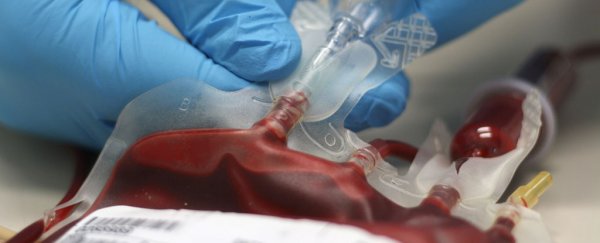It might sound like something out of a creepy folk tale, but scientists have found evidence that injecting young human blood into older bodies does seem to offer powers of rejuvenation – even if those old bodies aren't human themselves.
In a new study, researchers took blood samples from a group of healthy, young 18-year-old human participants and injected them into 12-month-old mice – late middle age in mice years, or the equivalent of being about 50 years old in human terms.
For three weeks, the mice received twice-weekly injections of human blood plasma – blood's liquid component, which scientists think is responsible for its rejuvenating properties.
After this, scientists from California-based biopharmaceutical company Alkahest compared the injected animals' behaviour to young and old control groups of three-month-old and 12-month-old mice – neither of which had received the plasma injections.
The new blood made the old mice act young again, with the treated animals running around in open spaces much like their younger controls.
But there was also evidence that their powers of memory had improved.
The researchers put the treated mice in a device called a Barnes maze – a tool used to measure spatial learning and memory in rodents.
Due to weaker memory, older mice tend to fare poorly at navigating the Barnes maze, but in the tests, the treated animals performed as well as young mice.
"We see a rejuvenation effect," one of the Alkahest researchers, Sakura Minami, told Jessica Hamzelou at New Scientist. "Young human plasma improves cognition. Their memory was preserved."
According to neuroscientist and Alkahest founder, Karoly Nikolich, the rejuvenating properties of young blood are down to the different protein makeups of young and old plasma.
Plasma contains thousands of proteins, but while young plasma contains a number of proteins that can rejuvenate tissues, with age these disappear and are replaced by damaging molecules.
"We have, actually, now for the first time discovered that there are hundreds of proteins that change with ageing," Nikolich told Juliette Goodrich and Molly McCrea at CBS.
"What we see in ageing plasma is that there is an increase of proteins that are inflammatory, that cause cell death."
As for what these proteins are exactly, the researchers aren't sharing those details just yet. But Minami says they not only have an effect on tissues in the body, but some are crossing over into the brain.
When the team examined cross sections of the brains of the mice that received the plasma treatment and compared them with similarly aged mice that hadn't received the injections, they saw the treated animals had greater amounts of newly formed neurons.
Neurons are formed in what's called neurogenesis, which is important for our ability to learn and memorise, and the mice brains suggest young human plasma increases the process.
"It's pretty dramatic," Minami told CBS. "[When we] do treatment we see a doubling of that."
The study was presented at the Society for Neuroscience annual meeting in San Diego this week, but it's important to note that it hasn't been published or peer-reviewed by other scientists yet.
So we need to bear that in mind while we consider the potential reach of this research – especially as the effects have only been demonstrated in mice so far.
But it's not the first study to find rejuvenation in mice due to young blood. A number of studies in 2014 found that blood infusions from young mice to older mice improved the older animals' cognition and strength – although the Alkahest research could be the first to find that human blood confers the same benefits across the two species.
The Alkahest researchers now want to investigate if young human plasma can do the same thing for older people too, and have begun a clinical trial at Stanford University involving 18 people with mild or moderate Alzheimer's disease.
If this trial proves successful, they hope to follow it up with a larger study involving more patients and greater plasma doses, to see if neurogenesis stimulated by young blood can counter the inflammation that leads to cognitive decline in neurodegenerative diseases such as Alzheimer's and Parkinson's.
It's not the only company looking into this kind of research. Another US startup called Ambrosia is currently recruiting volunteers for a clinical trial in which people aged 35 or older can receive a one-off injection of young plasma.
It's unclear though what anti-ageing benefits a one-off treatment would confer – and the trial has also attracted some criticism for charging participants a US$8,000 fee to cover costs.
That said, any studies in this area attracts a lot of attention – most notably from tech entrepreneur and PayPal co-founder Peter Thiel, whose personal interest in blood-based anti-ageing treatments has seen him channel millions into health research.
Ultimately, Alkahest says it would manufacture synthetic versions of the proteins required, as there isn't enough natural young human plasma in the world to help the number of people facing Alzheimer's.
But that's still a while away. For now, all eyes our focused on the first clinical trial, in which we'll get our first chance of seeing if young blood can help people as well as mice.
"The final results will come at the end of the year," Nikolich told CBS.
